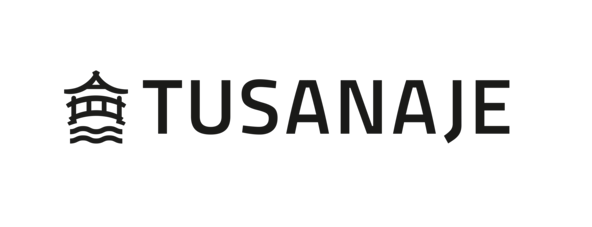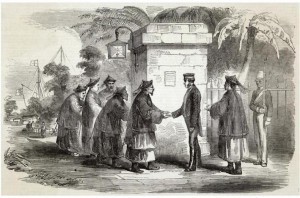[EN/ES/CH] Guangzhou, Guangdong: Foreign trade
- [EN/ES] Today in Chinese History (28 August 2014): Shakespeare and the Taichang Emperor - 28 agosto, 2019
- [EN/ES/CH] Guiping, Guangxi: The Taiping Rebellion - 19 marzo, 2019
- [EN/ES/CH] Guangzhou, Guangdong: Foreign trade - 25 febrero, 2019
(Originally published in the blog of My China Roots).
[English]
From 1757 until 1842, Guangzhou, or Canton as it was called back then, was China’s only official door to the outside world. With the aim to control China’s foreign trade, the ‘Canton System’ meant that all imports and exports had to pass through Canton. This exposed the Cantonese to people and products from overseas.
However, even in Canton, trade was restricted: foreigners could only trade through a designated Chinese monopoly called the Cohong, and could only stay and trade in 13 factories at the Canton port from October to March.
Camellia Sinensis
In spite of these restrictions, Canton was a popular, bustling port that took in rice from southeast Asia and exported silk and porcelain to Europe and beyond. China’s most popular export product at the time was the dried leaf of a plant called Camellia Sinensis. The British, in particular, developed a liking for the aromatic little beverage that would be drawn from it.
[Español]
Desde 1757 hasta 1842, Guangzhou o Cantón -como se llamaba entonces- era la única puerta oficial de China al mundo exterior. Con el objetivo de controlar el comercio exterior de China, el “Sistema de Cantón” suponía que todas las importaciones y exportaciones tenían que pasar por Cantón. Esto expuso a los cantoneses a las personas y a los productos de ultramar.
Pero incluso en Cantón el comercio era restringido: los extranjeros sólo podían comerciar a través de un monopolio chino determinado que se llamaba Cohong. Solo se podía permanecer y comerciar con trece fábricas en el puerto de Cantón y solo entre los meses de octubre y marzo.
Camellia Sinensis
A pesar de las restricciones, Cantón era un puerto popular y bullicioso que compraba arroz del sudeste asiático y exportaba seda y porcelana a Europa y más allá. El producto de exportación chino más popular en ese entonces era la hoja seca de una planta llamada Camellia Sinensis. Fueron los ingleses quienes desarrollaron un gusto particular por la aromática bebida que se extraía de ella.
[中文]
从1757年到1842年,广州,曾经被翻译成“Canton”,曾是中国唯一通往国外的官方门户。为了控制中国对外贸易,“一口通商”制度规定所有进出口事务都需要从广州通过。这就为广州人提供了率先接触外国人和外国产品的机会。
然而,即使是在广州,贸易活动也是受限制的——外商只能与国内指定的垄断企业“公行”进行交易,而且只能在每年10月至次年3月之间与广州港的十三家公行做生意。
茶叶
尽管有上述限制条件,那时的广州仍是一个热闹的港口城市,从东南亚进口的大米和向欧洲及更远的地方出口的丝绸和瓷器都要经过这里。当时,中国最有名的出口产品是一种烘干的植物叶子,作为饮料来饮用,它的名字叫做“茶叶”。而英国人则从其自身的习惯出发,改进了这种饮料的饮用方式。



No hay comentarios